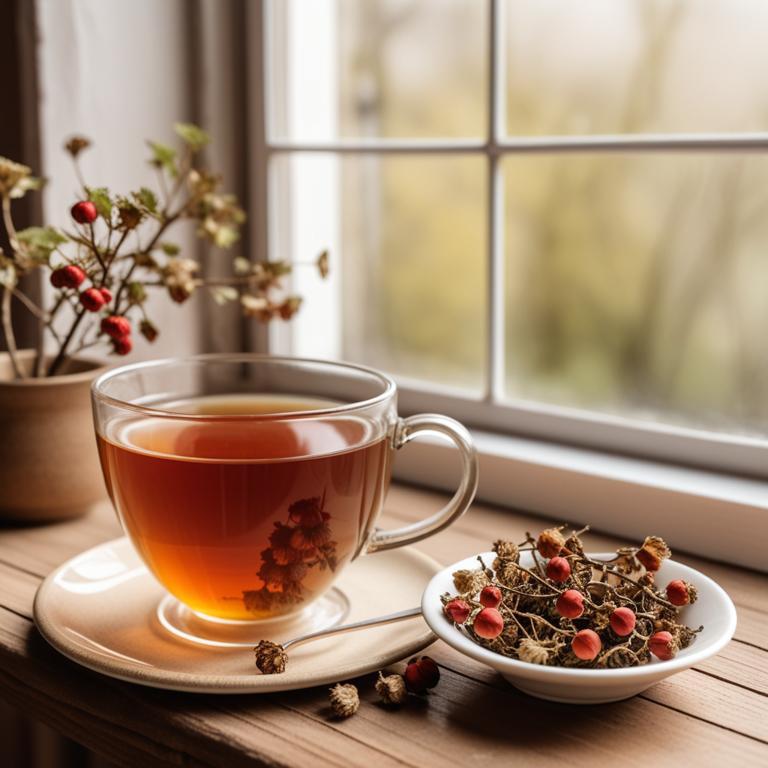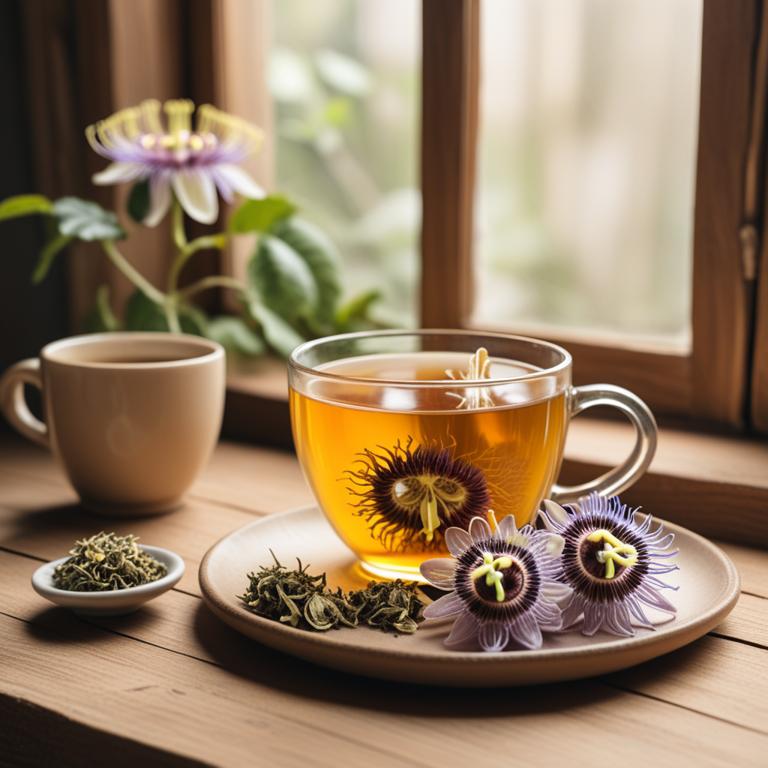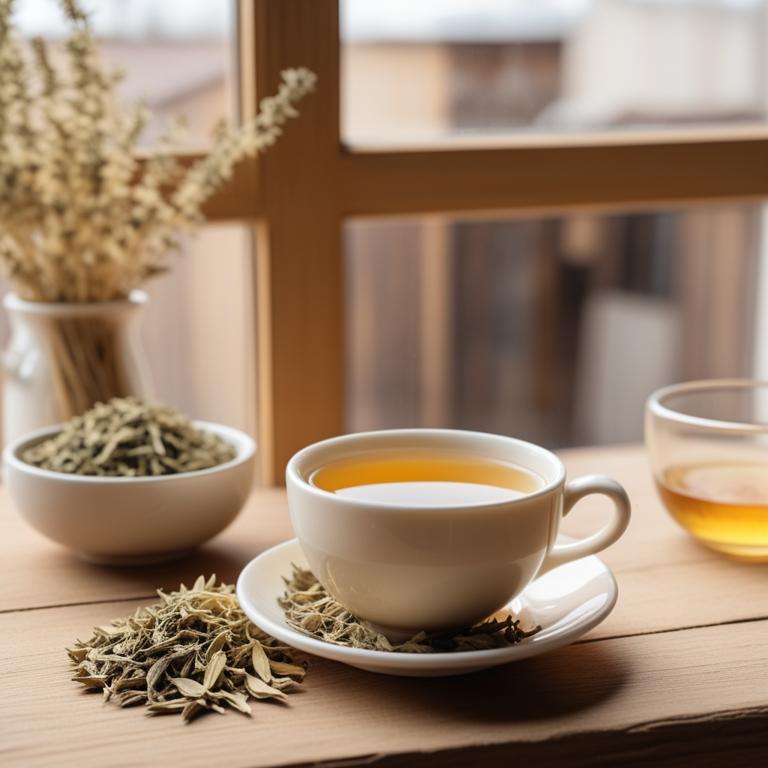11 Herbal Teas For Hypertension

Herbal teas have been a natural remedy for hypertension for centuries.
The main reason they help is by relaxing the blood vessels, reducing blood pressure and promoting a healthy heart rhythm. Herbs like Valeriana officinalis, also known as valerian root, can calm the nervous system and slow down the heart rate, which is beneficial for people with high blood pressure.
Ginkgo biloba, a popular herbal tea ingredient, improves blood flow and reduces inflammation in the blood vessels, making it easier for the heart to pump blood. Zingiber officinale, or ginger, has anti-inflammatory properties that help to reduce swelling in the blood vessels, making it easier for the blood to flow and lowering blood pressure. Drinking herbal teas like these can bring many benefits to your life, including improved sleep, reduced stress and anxiety, and increased energy levels.
By incorporating herbal teas into your daily routine, you can start to feel the positive effects on your body and enjoy a healthier, more balanced lifestyle.
- 1. Valeriana officinalis
- 2. Ginkgo biloba
- 3. Zingiber officinale
- 4. Panax ginseng
- 5. Lavandula angustifolia
- 6. Glycyrrhiza glabra
- 7. Crataegus monogyna
- 8. Passiflora incarnata
- 9. Avena sativa
- 10. Astragalus membranaceus
- 11. Rosmarinus officinalis
1. Valeriana officinalis

Valeriana officinalis teas contains valerenic acid, valepotriates, and isovaleric acid as its main bioactive constituents.
These compounds have a relaxing effect on the nervous system, which helps to reduce stress and anxiety. By decreasing stress levels, Valeriana officinalis teas can help to lower blood pressure and alleviate hypertension. The vasodilatory properties of valerenic acid also help to widen blood vessels, improving blood flow and reducing the strain on the heart.
Regular consumption of Valeriana officinalis teas may help to regulate blood pressure and promote cardiovascular health.
- Get 1 cup of boiling water and 1 teaspoon of dried Valeriana officinalis root.
- Steep the dried root in boiling water for 5-7 minutes.
- Strain the liquid into a cup using a tea strainer or a piece of cheesecloth.
- Add 1 tablespoon of honey (optional) to the tea for taste.
- Drink the tea 2-3 times a day, preferably before bedtime, to help manage hypertension.
2. Ginkgo biloba

Ginkgo biloba teas contains flavonoids and terpenoids as its bioactive constituents.
These compounds have anti-inflammatory and antioxidant properties that help lower blood pressure. The flavonoids, particularly quercetin and kaempferol, act as vasodilators, which means they widen blood vessels and improve blood flow. This helps reduce the strain on blood vessels and lower blood pressure.
The terpenoids, including ginkgolides and bilobalides, inhibit platelet activation and aggregation, further contributing to blood pressure reduction.
- Gather 1 cup of water and 1 teaspoon of dried Ginkgo biloba leaves or 2 teaspoons of fresh Ginkgo biloba leaves.
- Heat the water in a pot until it reaches a boil, then reduce the heat to a simmer.
- Add the Ginkgo biloba leaves to the pot and let them steep for 5-7 minutes.
- Strain the tea into a cup using a tea strainer or a piece of cheesecloth to remove the leaves.
- Drink the tea 1-2 times a day, ideally in the morning and evening, to help manage hypertension.
3. Zingiber officinale

Zingiber officinale teas contains compounds like gingerols and shogaols, which have anti-inflammatory and antioxidant properties.
These bioactive constituents help relax blood vessels and improve circulation, reducing blood pressure. The vasodilatory properties of gingerols and shogaols also help increase the diameter of blood vessels, allowing blood to flow more easily and reducing the pressure on blood vessel walls. The anti-inflammatory effects of Zingiber officinale teas also help reduce inflammation in blood vessels, which can contribute to hypertension.
By reducing blood pressure and improving circulation, Zingiber officinale teas may be a useful complementary therapy for people with hypertension.
- Gather 1 tablespoon of dried Zingiber officinale root and 1 cup of boiling water.
- Add the dried root to a cup or teapot, then pour in the boiling water.
- Let it steep for 5-7 minutes to allow the flavors to mix.
- Strain the tea into another cup using a tea strainer or cheesecloth.
- Drink the tea 2-3 times a day, as needed, to help manage hypertension symptoms.
Zingiber Officinale Tea on Amazon
FGO Organic Ginger Tea, 100 Count, Eco-Conscious Tea Bags, Caffeine Free, Packaging May Vary (Pack of 1)
Disclaimer: We earn a commission if you click this link and make a purchase at no additional cost to you.
4. Panax ginseng

Panax ginseng teas contains bioactive constituents such as ginsenosides, specifically Rg1 and Rb1, which have been shown to help lower blood pressure in people with hypertension.
These compounds have vasodilatory properties, which means they cause blood vessels to widen, reducing the pressure inside them. The ginsenosides also have antioxidant properties, which help protect the blood vessels from damage caused by free radicals. Additionally, Panax ginseng teas have been found to inhibit the activity of the enzyme renin, which plays a key role in the development of high blood pressure.
As a result, drinking Panax ginseng tea regularly may help to reduce blood pressure and alleviate symptoms of hypertension.
- Gather 1 cup of boiling water, 1 teaspoon of dried Panax ginseng, and a tea infuser or a heat-resistant cup.
- Measure 1 teaspoon of dried Panax ginseng and put it in the tea infuser or directly into the heat-resistant cup.
- Pour 1 cup of boiling water over the Panax ginseng and let it steep for 5-7 minutes.
- Strain the tea into another cup using the tea infuser or a fine-mesh sieve if you used the heat-resistant cup.
- Drink the Panax ginseng tea 1-2 times a day, ideally in the morning and evening, to help manage hypertension.
5. Lavandula angustifolia

Lavandula angustifolia teas contains a mix of bioactive constituents, including linalool and linalyl acetate, which have a direct impact on blood vessels and heart rate.
The relaxing properties of these compounds help to calm the nervous system and lower blood pressure, making it easier to manage hypertension. Linalool in particular has been shown to inhibit the activity of angiotensin-converting enzyme, which plays a key role in blood pressure regulation. This action helps to reduce the amount of blood vessels constricting and allows for a more efficient blood flow, contributing to a decrease in blood pressure.
By promoting a balance in blood vessel activity, Lavandula angustifolia teas helps to alleviate hypertension symptoms and promote a healthier cardiovascular system.
- Gather 1 cup of dried Lavandula angustifolia flowers. You can buy them from a store or grow your own.
- Use a tea infuser or a piece of cheesecloth to hold the flowers. Place 2 tablespoons of flowers in the infuser or cheesecloth.
- Heat 1 cup of water in a kettle or on the stove. Bring the water to a boil, then reduce the heat.
- Pour the hot water over the flowers in the infuser or cheesecloth. Let it steep for 5-7 minutes.
- Strain the tea and discard the flowers. Drink 1 cup of the tea 2-3 times a day to help manage hypertension.
6. Glycyrrhiza glabra

Glycyrrhiza glabra teas contains glycyrrhizin, a triterpene saponin with anti-inflammatory and blood pressure-lowering properties.
Glycyrrhizin inhibits the enzyme 11-beta-hydroxysteroid dehydrogenase, which helps to decrease the production of aldosterone, a hormone that causes the body to retain sodium and water, leading to high blood pressure. The flavonoids and phenolic acids in Glycyrrhiza glabra, such as quercetin and luteolin, also have antioxidant and vasodilatory effects that help to relax blood vessels and improve blood flow. The potassium content in the tea can help to counterbalance the effects of sodium in the body and promote the excretion of excess fluids.
By reducing the levels of sodium and aldosterone and promoting vasodilation and potassium balance, Glycyrrhiza glabra teas may help to lower blood pressure and alleviate hypertension symptoms.
- Gather ingredients: 1 cup of dried Glycyrrhiza glabra root, 1 cup of boiling water, and a tea infuser or strainer.
- Measure 1 teaspoon of dried Glycyrrhiza glabra root and place it in the tea infuser or strainer.
- Pour 1 cup of boiling water over the root in the infuser or strainer.
- Let the tea steep for 5-7 minutes to allow the flavors to release.
- Strain the tea and drink 1/2 cup, 2-3 times a day, after consulting a doctor or a qualified healthcare professional for hypertension treatment.
7. Crataegus monogyna

Crataegus monogyna teas contains flavonoids, specifically quercetin and epicatechin, which have antioxidant properties that help reduce inflammation in blood vessels.
The tea also contains oligomeric proanthocyanidins (OPCs), which are powerful antioxidants that help protect blood vessels from damage. The OPCs in Crataegus monogyna teas work by improving blood vessel function and reducing blood pressure. The flavonoids in the tea also help to relax blood vessels, allowing blood to flow more easily and reducing the workload on the heart.
Regular consumption of Crataegus monogyna teas may help to lower blood pressure in individuals with hypertension.
- Gather 1 cup of fresh or dried Crataegus monogyna leaves. Use organic and clean leaves.
- Measure 1 tablespoon of the leaves and put them in a heat-resistant cup or infuser.
- Pour 1 cup of boiling water over the leaves. Let it steep for 5-7 minutes.
- Strain the tea into another cup. Discard the leaves. Add honey or lemon to taste.
- Drink 1 cup of the tea 2-3 times a day. Consult a doctor before using it for hypertension.
8. Passiflora incarnata

Passiflora incarnata teas contains flavonoids like quercetin and kaempferol, and alkaloids like harmine and harmaline.
These compounds help relax blood vessels and improve blood flow, which is beneficial for people with hypertension. Quercetin, in particular, has anti-inflammatory properties that can reduce blood pressure by preventing the constriction of blood vessels. Harmine and harmaline also have a sedative effect, which can help lower blood pressure by reducing stress and anxiety.
Regular consumption of Passiflora incarnata tea may help alleviate hypertension symptoms by promoting relaxation and reducing blood vessel constriction.
- Gather 1 cup of dried Passiflora incarnata flowers and 1 cup of boiling water.
- Steep the dried flowers in the boiling water for 5-7 minutes.
- Strain the mixture through a fine-mesh sieve into a cup.
- Add 1 tablespoon of honey to sweeten the tea, if desired.
- Drink 1 cup of the Passiflora incarnata tea 2-3 times a day as needed for hypertension.
9. Avena sativa

Avena sativa teas contains bioactive constituents like avenanthramides, avenacosides, and ferulic acid, which have been shown to have a positive effect on blood pressure.
Avenanthramides, in particular, have been found to relax blood vessels and improve blood flow, reducing the pressure on the blood vessels. Avenacosides have been proven to inhibit the activity of angiotensin-converting enzyme (ACE), which plays a key role in regulating blood pressure. Ferulic acid has antioxidant properties that help reduce inflammation in the blood vessels, making them more flexible and less prone to constriction.
By reducing the constriction of blood vessels and improving blood flow, Avena sativa teas can help lower blood pressure in individuals with hypertension.
- Gather 1 cup of dried Avena sativa root or 2 tablespoons of Avena sativa root powder.
- Heat 1 cup of water in a pot until it boils.
- Add the dried Avena sativa root or the powder to the boiling water.
- Reduce heat and let it simmer for 5-10 minutes. Strain the liquid with a fine-mesh sieve into a cup.
- Drink the tea 2-3 times a day, ideally 30 minutes before meals, as needed to help manage hypertension.
10. Astragalus membranaceus

Astragalus membranaceus teas contains bioactive constituents like astragaloside IV, isoflavones, and polysaccharides.
These compounds have anti-inflammatory and antioxidant properties that help lower blood pressure by reducing oxidative stress and inflammation in blood vessels. The tea's flavonoids, particularly quercetin and kaempferol, also have vasodilatory effects, which help widen blood vessels and improve blood flow, reducing the strain on the heart. Additionally, Astragalus membranaceus teas contain compounds that help regulate the body's response to stress, which is often linked to high blood pressure.
By reducing stress and inflammation, Astragalus membranaceus teas can help alleviate hypertension symptoms.
- Gather ingredients: 1 cup of Astragalus membranaceus dried roots or 2 teaspoons of Astragalus membranaceus powder, 1 cup of boiling water.
- Measure 1 cup of boiling water into a teapot or cup.
- Add 1 cup of dried Astragalus membranaceus roots or 2 teaspoons of Astragalus membranaceus powder to the teapot or cup.
- Steep for 5-10 minutes to allow the roots or powder to infuse into the water.
- Strain the tea and drink 1-2 cups per day, as directed by your healthcare provider for hypertension treatment.
11. Rosmarinus officinalis

Rosmarinus officinalis teas contains a compound called carnosic acid, which is a potent antioxidant.
This antioxidant helps to reduce inflammation in blood vessels, making them more flexible and less likely to constrict. Rosmarinus officinalis teas also contains rosmarinic acid, a compound that has been shown to reduce blood pressure by blocking the action of angiotensin-converting enzyme (ACE). ACE is an enzyme that causes blood vessels to constrict, leading to high blood pressure.
By blocking ACE, rosmarinic acid helps to relax blood vessels and improve blood flow, which can help to lower blood pressure.
- Gather 1 cup of fresh or dried Rosmarinus officinalis leaves.
- Add 1 cup of boiling water over the Rosmarinus officinalis leaves and let it steep for 5-7 minutes.
- Strain the liquid into a cup and discard the leaves.
- Drink 1/2 cup of the tea 2-3 times a day to help manage hypertension.
- Consult a doctor or a qualified healthcare professional before using Rosmarinus officinalis tea for hypertension treatment.